Rye Barcott's Blog, page 10
October 10, 2017
Because Strong Girls Make Strong Communities
Today, October 11, is recognized by the UN as International Day of the Girl Child in honor of women who are affected daily by inequalities. On this day, we are called to not only draw attention to the issues that women face, but also celebrate the accomplishments of the fierce women who changed laws, defied stereotypes, and advocated for equality for all.

International Day of the Girl Child was first observed in 2012. Since then, it has become an annual campaign that raises awareness about women’s issues. This year, the UN chose to revolve festivities around the theme of “EmPOWER Girls: Before, after, and during crises.” The UN notes that conditions for young girls have improved greatly, but the issue that arises is whether women will be continually supported into their teens.
Many young women in Kibera do not have access to sufficient higher education or may suffer from gender violence, domestic abuse, or unwanted pregnancies, among other things. Our Tabitha Medical Clinic serves the Kibera community, offering a convenient and safe location to receive medical care including low-cost access to reproductive health services such as HIV/AIDS testing, cervical cancer screenings and treatments, and family planning counseling, all for a flat fee. In addition to the main clinic, we operate two voluntary counseling and testing facilities that offer information about healthy sexual practices.

We believe that young people benefit from learning about healthy sexual reproduction to prevent issues in the future. We empower youth peer educators to serve as volunteers in their communities to start conversations about these and other health topics with their friends. Recognizing the importance of continued support, we have designed these programs to be sustainable models that enable young women to be life-long learners and give back to their communities.
In addition, we believe that education is a basic human right and critical to long-term social change for young girls and women, and for communities. It is a stabilizing factor for children who have experienced trauma, a key contributor to country-wide economic growth, and the foundation to healthier, more educated future generations – especially when girls are educated.

We are proud that our Angaza Education program supports this basic right for girls and covers the full cost of high school tuition and offers enrichment opportunities for scholarship recipients. Additionally, our Binti Pamoja Core program for girls ages 10-17, provides artistic and educational activities that allow the girls to discover new passions and develop talents, and gain new life skills like financial literacy. Graduates of the program host discussions in designated “Safe Spaces” about gender-based violence, reproductive health, and financial literacy.
Providing girls and young women with needed health care, in addition to safe spaces both physically and emotionally, in which to grow, learn, and express themselves is crucial to helping girls escape poverty and leverage important opportunities.
![DSC_0260 1 [edited 2]](https://i.gr-assets.com/images/S/compressed.photo.goodreads.com/hostedimages/1402086049i/9891992._SX540_.jpg)
Ultimately, our goal at CFK is to impact every aspect of a girl’s life, ensuring that she is educated, healthy, active, and happy. This International Day of the Girl Child, join us as we celebrate the accomplishments of women today and help us change the realities that women face tomorrow.
Invest in Girls. Change the world. Donate today!
October 4, 2017
New Binti Pamoja Center triples space for Girls
Across the world, and especially in Kibera, adolescent girls are marginalized and more vulnerable than boys. In addition to struggling with extreme poverty on a daily basis, girls often face hardships like early marriage, sexual violence, and female genital mutilation from a very young age.
What is more alarming is that less than 1% of girls in Kibera have access to a girls-only program. Giving girls a safe space, both physical and emotional, in which to express themselves is crucial to helping them escape poverty and leverage important opportunities.
![Binti Girls - Aug 2016 [Sarah Strohmayer] [media]](https://i.gr-assets.com/images/S/compressed.photo.goodreads.com/hostedimages/1507202387i/24090557._SX540_.jpg)
With this idea in mind, we are so excited to announce that construction is complete on the brand new center for our Binti Pamoja program. Tripling the space of the current program site, the new building features a conference center, a space for a computer lab, a kitchen with dining area and a number of staff and volunteer office spaces. Our 3-story center, a first of of its kind in Kibera, is for the girls of Kibera, providing them with a permanent space to call their own.
Now that the roof has been raised, we are looking our partners and our supporters to help us outfit the new center. Kitchen appliances, furniture, telecommunication equipment, computers and software, office supplies, landscaping – you name it. We need it.
Invest in girls. Change the world. Please consider making a donation in support of our Binti Pamoja program today. Donate Now.
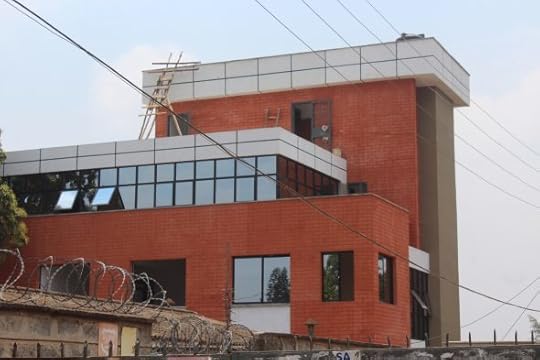
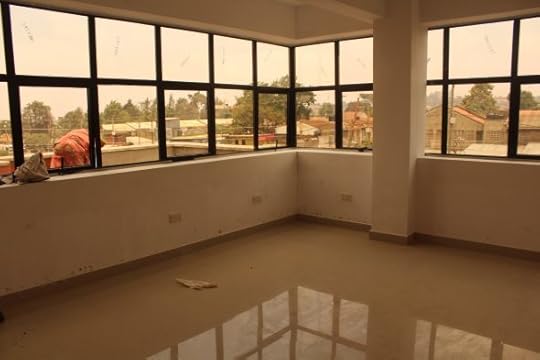
About Binti Pamoja
The Binti Pamoja [Daughters United] Program mentors girls between the ages of 10-17. Run by program staff, the core program helps girls discover their personal leadership and build confidence. Using arts activities like photography, drama, and dance, the program empowers girls while also teaching them about sexual and reproductive health and financial literacy.
Replicated in girls programs across the globe, Binti Pamoja employs an innovative “cascading leadership” methodology. After girls graduate from the Core Program, they create their own Safe Spaces support groups in the community, mirroring the Core Program’s model. Typically meeting in local churches and schools, these Safe Spaces help girls develop leadership skills and confidence and reach girls in all areas of Kibera.
October 3, 2017
Lessons Learned: Digital Skills Improve Confidence for Girls
By Carolyn Lamere
In my first couple of weeks as the summer 2017 Peacock Fellow, I spent some time getting to know some of Carolina for Kibera’s existing programs, before beginning to strengthen ties and reinvigorate partnerships with other organizations across Nairobi. As part of this introduction, I spent a wonderful couple of hours with some participants in CFK’s computer skills training course. This course is open to girls ages 17-22, who receive training in not only basic computer skills like typing, word processors, and spreadsheets, but also in high level coding and graphic design.
The young women I spoke to were bright, energetic, and enthusiastic about their field of study. Some of the participants were not attracted to computers specifically before beginning the program – “after finishing Form 4 [grade 12], I had nothing to do, so I just decided to have the chance,” one woman told me. However, after completing the program, they are passionate about computers, programming and graphic design, and are confident that their new skills will open doors for them. “It’s a world of technology,” said one participant, noting that if you don’t have experience with computers, “you’ll just be left behind.
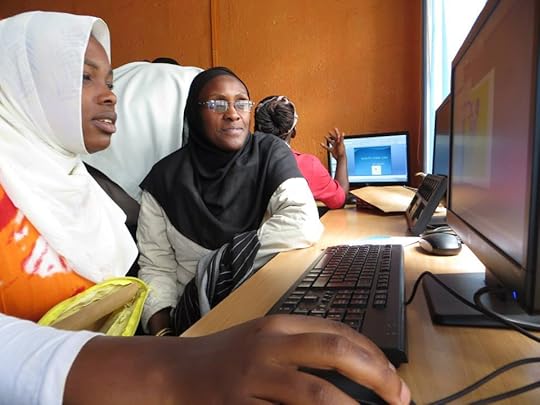
All the participants spoke of the challenges of getting well-paying jobs, but said this program had given them confidence. “If I was to pick a job before attending this course, I would say any job is ok. But since I’ve gone through the program, I’ve learned a lot of things – my mindset is set for what I’ve learned. I can’t go for [just] any job,” one participant noted. Another said that “we have a lot of hopes,” and a third agreed: “we’ll keep trying. Because they say winners never quit, so we are going to try until we get it.”
I also asked these program participants for suggestions for how to improve the program for future cohorts. The number one suggestion was to increase the capacity of the program to allow more young women to participate. The women also reported some challenges which could be addressed with more funding – for example, a generator could be used to allow them to continue to learn even during electricity outages, which they said occurred roughly every other day. Some funding cuts from donors also led to some lessons being abridged.
The women I spoke to have the drive to succeed, and to build a better life for themselves and their families. I can’t wait to see what they do next!
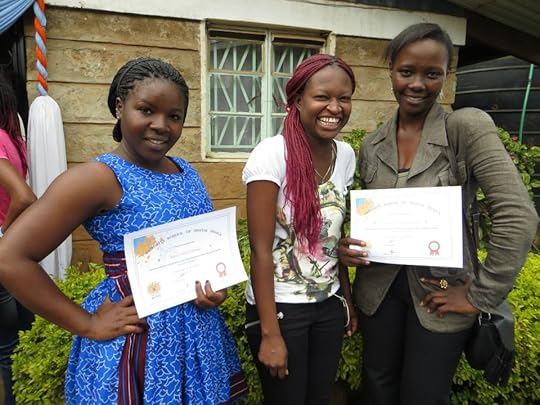
The Girls Training Center is a cornerstone of CFK’s technology initiative and was created exclusively for girls interested in learning information technology. In partnership with Nairobits Trust, an organization based in Nairobi that strives to empower marginalized youth living in slums, our computer lab programs offer girls training in different aspects of multimedia, web and graphic design, online research and coding in different languages.
CFK’s initiative is unique in that it helps develop the whole girl: educating her mid, supporting her health, and help secure her future success. Beyond computer skills, girls learn about entrepreneurship and life skills, including topics like marketing and branding to self-esteem and confidence to reproductive health and wellness.
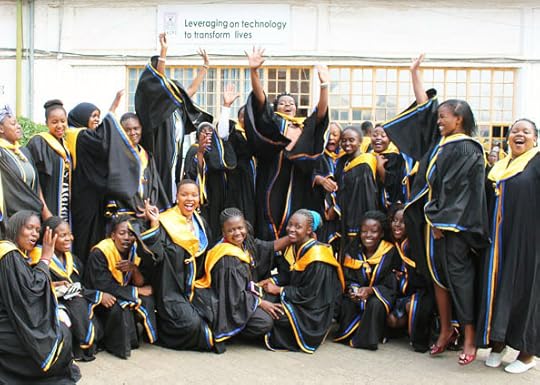
Class of 2017, Girls ICT Training Program
October 2, 2017
It Takes a Village
Mothers in Kibera face many obstacles in breastfeeding. Cultural stigmatization, a lack of information regarding health benefits, and the absence of equipment and facilities all impede this vital aspect of nutritional development, and by extension, family and community well-being. Our community care groups are changing that.
With supportive family members surrounding them, mothers have a much easier time breastfeeding and continue the practice for longer periods of time. While fathers may be willing to lend a hand, often times they are not able due to lack of information or even knowing what support can look like. Breastfeeding works best when men are involved, and our community care volunteers and health workers are partnering with families to educate and empower fathers and men to feel confident in their support roles.
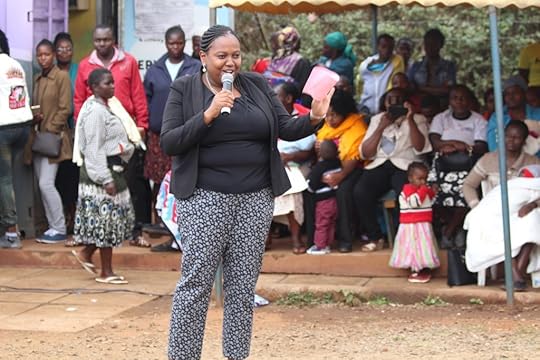
In partnership with the the Kenyan Ministry of Health and community partners including Save the Children, Feed the Children, and Kidogo, we offered the Kiberan community a unique program for 2017 World Breastfeeding Week. So in true spirit of the week’s theme – Sustaining Breastfeeding Together and Creating Partnerships – our program addressed how men and fathers can better support breastfeeding and be an advocate for the women in their lives. Dr. Carol Ngunu-Gituathi, deputy director of health of Nairobi County, was our guest of honor for the event held on September 8th in the Kianda village of Kibera.
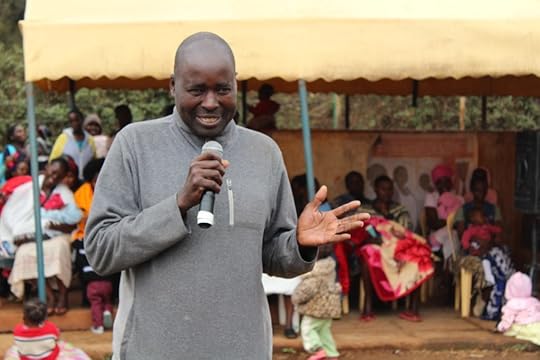
We also welcomed father of four, Lucas, to share his message on how friends and family, and fathers especially, can be a pillar of support to the women in their lives who have just given birth. Lucas learned information about the importance of and many benefits of breastfeeding from community care group sessions. While his first three children were not exclusively breastfed, he wanted to ensure his fourth child had this opportunity and looked to ways to better support his wife.
We are thrilled that more than 1,000 women and community members joined this partnership in celebrating community wellness and the importance of breastfeeding for overall health and well being of mother and child. Thanks so much to everyone involved! Together, we are making an impact and improving health for all Kiberans.

September 18, 2017
Hillary Omala: New Kenya-based Executive Director
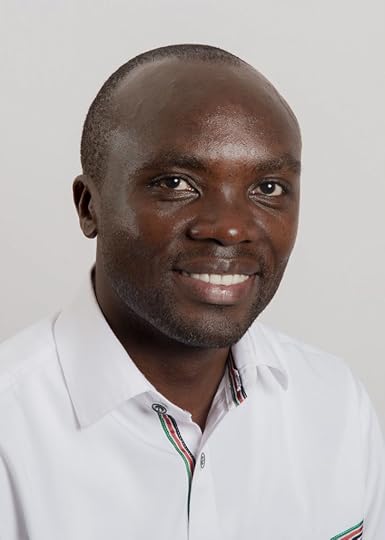
Hillary Omala
We are excited to announce longtime community leader and nonprofit champion, Hillary Omala, will serve as the new executive director for our Kenya office. He previously served as executive director for CFK from 2011-2014.
“We are thrilled that Hillary Omala comes from within and will continue his long relationship with CFK in his new role as Executive Director. His past leadership in Tabitha Clinic and at the helm of CFK, his recent contributions to CFK as board member and co-chair of the HR Committee, the skills he acquired through his ownership of the Enai Group Consulting Company and his broad-based knowledge across diverse sectors will help him to lead CFK to a new level of capacity and reach. We speak for all board members in warmly welcoming Hillary as the new Executive Director of CFK,” shared Kathleen McGinn (US) and David Mshila (Kenya), joint board chairs for the organization.
As executive director, Hillary will lead Kenya-based staff and operations, and provide leadership and direction for the implementation of CFK’s strategic plan including partnerships, financial and human resources management, communications and fundraising. In addition, Hillary will work in close collaboration with Shamecca Bryant, CFK’s deputy director based in the US to carry out the strategic vision of the organization.
“The best strategies for overcoming the effects of poverty and progressing towards a better future must come from within the community itself. I am beyond eager to provide leadership for and partner with staff and the community as we develop local leaders, catalyze positive change and alleviate poverty in Kibera,” said Hillary.
Hillary joins CFK with a long history in the nonprofit sector managing health systems, leading research and policy development, providing program direction and technical assistance and leading strategic partnerships. He has spent the past 10 years focused on strategic planning and implementation work for non-governmental organizations with an emphasis on capacity building and monitoring and evaluation. His expertise includes operations management, resource mobilization, strategic partnership development and board and staff development.
“I believe the residents of Kibera are true development experts. Working together, I look forward to expanding the opportunities Carolina for Kibera offers to youth and their families, as well as pushing the organization to find new, creative and better ways to respond to community challenges, manage resources and develop programs,” he added.
Prior to his appointment, Hillary served one three-year term as a member of the board of trustees for CFK in Kenya. In addition, he owns and operates Enai Group, a consulting firm advising health practitioners, companies, and nonprofits on how health education and treatment intersects with environmental sustainability.
Hillary earned a Bachelor of Arts in sociology and communication from the University of Nairobi and has a postgraduate diploma in project management from Nairobi’s Centre for Finance and Project Management. He is a finalist for a master of public health (MPH) at the University of Nairobi, majoring in health economics and policy development and is currently undertaking research in the area of healthcare financing.
Welcome, Hillary!
August 11, 2017
Playing for Peace
“Sport has a unique and irreplaceable capacity to unite people, going far beyond ethnic, religious or social differences. I am convinced that sport can be at the long-term service of peace.” – H.S.H Prince Albert II of Monaco.

Kibera was declared by Kenya’s security agencies as a hot spot for potential violence going into the 2017 election season. In 2007, the community was overwhelmed by violence following the country’s highly contested general elections. Hundreds of people were killed, businesses were destroyed, and the local economy fell apart after residents who supported different political parties challenged, and even fought, one another largely along tribal lines.
Peace development is at the foundation of how we work as an organization – empowering the community by including people of diverse and different backgrounds – and is at the heart of our sports program. In advance of the election, our sports and peace development program increased our engagement in violence prevention with the community through matches and tournaments, community clean-up days, and numerous educational programs for youth and adults.

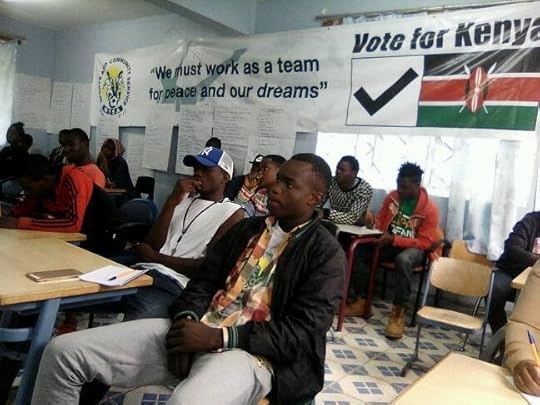
Our Kibera Champions League, which annually reaches more than 5,000 girls, boys and coaches, is truly training the next generation of peacemakers. Since its inception, the sports program has used sports to teach healthy life choices and promote peace across gender and ethnic divides in Kibera. Competing teams must reflect the ethnic diversity of Kibera, which creates rare opportunities for inter-ethnic teamwork and friendship.
Soccer also holds the power to start conversations for overcoming barriers and improving aspects of communities. In addition to regular team practices, training, and tournaments, youth learn leadership skills, the importance of solidarity, and engage in collaborative, community service projects with teammates and other program participants.
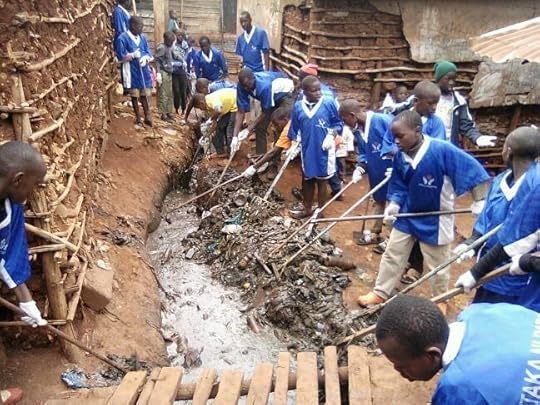
During the last 15 years, thousands of Kenyans have been killed in ethnic conflicts. And throughout these 15 years, our Champions League has held more than 20,000 soccer matches. All of them have ended without a fight, including our 2017 Peace Tournament we hosted in July with the election in close sight.
“Sport has the power to change the world,” Nelson Mandela once said. “It has the power to inspire. It has the power to unite people in a way that little else does. It speaks to youth in a language they understand. Sport can create hope where once there was only despair. It is more powerful than government in breaking down racial barriers.”
Sometimes the games we play are just the games we play. But as Mandela’s past reminds us, sometimes they are so much more. Jamii ya Kibera.
Did you know our documentary film Without a Fight tells a story of peace-building through sports, featuring players from Carolina for Kibera’s Champions League? Get your copy today… All proceeds go to support CFK’s Sports Association in Kenya!
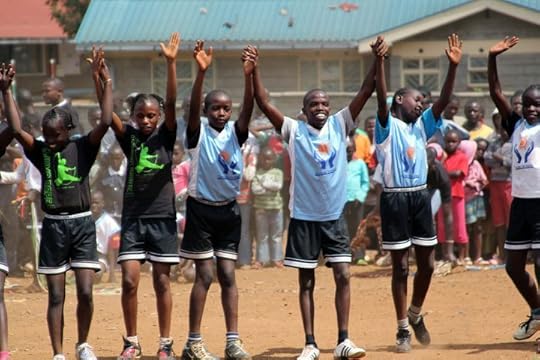
August 10, 2017
Sole Support Two Feet at a Time
Thousands of children in Kibera now have a brand new pair of shoes on their feet, some for the first time, thanks to an on-going partnership with TOMS Shoes. Designed to complement our health, educational, and economic development programs, TOMS’ giving project One for One©, has been supporting the Kiberan community since 2013.
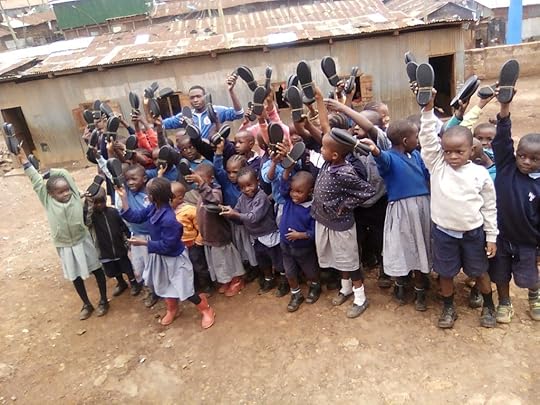
Kibera’s rugged terrain, lacking roads, lights and trash facilities, is a less than ideal environment for health. Skin abrasions are common and often become infected. Providing shoes to children helps give them the ability to go to school, to activities, and to participate in their communities without fear of injury and illness that can easily happen with bare feet.
“Our partnership with TOMS helps us get closer to realizing our vision. Shoes prevent soil transmitted diseases and the support from TOMS supplements our health program’s efforts. Shoes are also part of required school uniforms and thus, offering shoes will be essential to increasing overall attendance at schools,” said Kennedy Juma, sports project officer, who helped facilitate this year’s distribution.
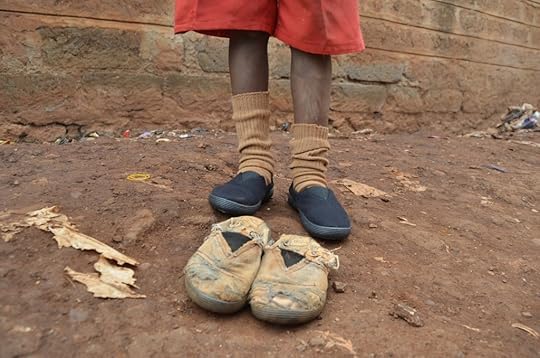
This summer, our annual distribution reached over 70 schools, 80 soccer teams, students and families participating in our Angaza education, families receiving community health support and care, over 3,150 girls in Binti Pamoja (Daughters United), our early childhood development and nutrition center children and families, and more! Nearly 55,000 pairs of shoes were given to the children and families most in need of them. Now, that’s a lot of “sole” support!
Shoes are a basic need for everyone, and having kids in school, working and being healthy is a huge factor in breaking societies out of poverty. Hats off, or rather ‘shoes on’, to TOMS for their continued support of children and families in Kibera, and their steps to eradicate poverty around the globe.
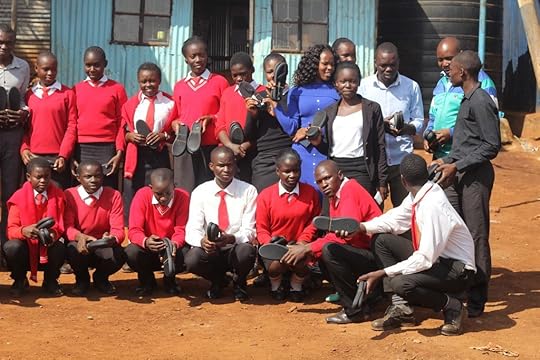
August 9, 2017
A Leader’s Path: UNC Chancellor Carol Folt visits Kibera
This past June, we had the great pleasure of hosting UNC Chancellor Carol Folt while she explored global opportunities in sub-Saharan Africa. Traveling to both Zambia and Malawi, Chancellor Folt made her last stop on the continent in Nairobi, Kenya, including a visit to our offices and programs.

Kenya Board of Trustees David M’shila and Hillary Omala welcomed Chancellor Folt over breakfast, followed with a tour down Kibera Drive to witness the day to day activity across several of Kibera’s villages. A short walk into Gatwakera took the chancellor to Tabitha Medical Clinic where she toured the facilities, met with staff and clinicians, and learned more about our long-term partnership with the U.S. Centers for Disease Control.
Next was a meeting with the newly-formed girls’ parliament in Kibera, in which representatives from each of Kibera’s thirteen villages convene to discuss issues they wish to bring forth to Kiberan authority figures. Chancellor Folt spent time talking with the girls, asking them questions as well and talking about her role at the university. Encouraged by the chancellor’s story, one inspired girl from Kibera asked, “How do I become president of a university?”
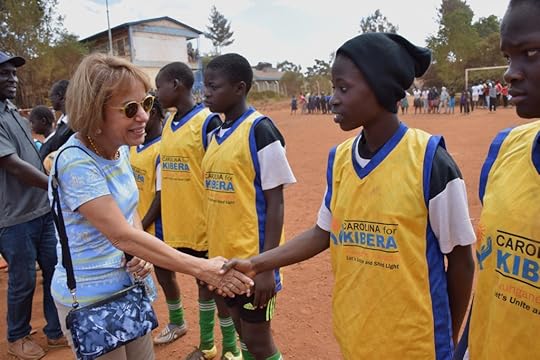
A trip to Kibera would not be complete without attending a soccer match! Fortunately, the chancellor’s visit overlapped the girl’s league tournament finals held this year. Chancellor Folt interacted with several of the team organizers, players and referees. Following a championship win for U11 girls team, the chancellor toured the Binti Pamoja Girls Center construction site whose third story offers a panoramic view of Kibera.

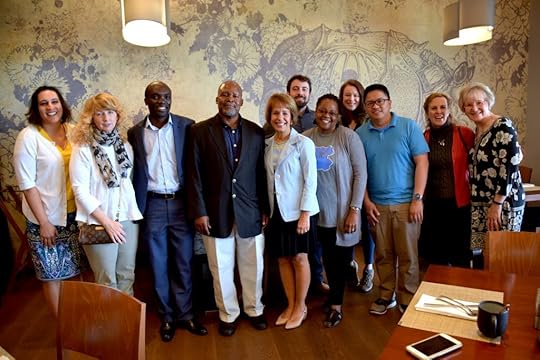
Rounding out the day was a dinner with Dr. Chowa, staff and researchers with Global Social Development Innovations (GSDI), which is housed with the UNC School of Social Work, to learn about the center’s work with youth workforce development in Kenya. Many distinguished guests were in attendance including representatives from MasterCard Foundation and the U.S. Ambassador to Kenya, Robert Godec.
The next morning, representatives from Johnson & Johnson’s corporate social responsibility unit and Mkopa founder and UNC graduate, Jesse Moore, gathered to discuss health and energy services in Kenya. Last, but certainly not least, shopping at the Maasai Market. Everyone walked away with something, including new bartering skills!
It was a true honor to host UNC Chancellor Folt and introduce her to our work in Kibera. She is a true champion for CFK!
To learn more about GSDI’s work and partnership with CFK, click here.

February 16, 2017
CFK Welcomes US-Based Deputy Director, Shamecca Bryant
2016 marked  Carolina for Kibera’s 15th anniversary of providing community-driven programs that foster leadership and create opportunities in Kibera. In 2016, we celebrated our successes, looked toward the future, and acknowledged that there is so much yet to be done. We asked big questions about what constitutes progress for a participatory development organization in one of the world’s largest informal settlements, and we agreed on one common theme: respectful and productive partnership.
Carolina for Kibera’s 15th anniversary of providing community-driven programs that foster leadership and create opportunities in Kibera. In 2016, we celebrated our successes, looked toward the future, and acknowledged that there is so much yet to be done. We asked big questions about what constitutes progress for a participatory development organization in one of the world’s largest informal settlements, and we agreed on one common theme: respectful and productive partnership.
In 2017, we’re excited to announce that a new leader is joining our US office. Shamecca Bryant will be assuming the role of the US-based Deputy Director of Carolina for Kibera. In keeping with our participatory approach, the Deputy Director will work in close collaboration with Julian Rowa, CFK’s Executive Director based in Kenya. Shamecca will lead US-based operations, providing technical leadership and direction for strategic partnerships, communications, and fundraising. We’re very excited for her to join our team.
Shamecca has a long and accomplished history working with local, national, and international nonprofit organizations. Most notably, she led the monumental growth of the Orange County Rape Crisis Center (OCRCC) in Chapel Hill as its Executive Director from 2010 to 2015. At the end of 2015 she embarked on a new, challenging venture of starting her own consulting firm for nonprofits. Shamecca thinks and acts long-term, meticulously mapping out each step required to achieve organizational goals. As CFK embarks on a new strategic vision over the next several years, Shamecca’s talents will be instrumental in helping guide us to our destination.
Through her consulting work, Shamecca became progressively more interested in using her skills to help an international organization grow. She was drawn to CFK for its philosophy as much as its programming, saying, “I became specifically interested in CFK, because I think that sometimes organizations do all the work, set the table, set the menu, and say, ‘Come and get it.’ It’s rare, even now, for them to ask what people need first.” She added, “Ensuring the community leads themselves, while helping to supply the resources they need to do that, is incredibly important.”
Shamecca is also well prepared for the challenges of operating an international non-profit like CFK. “International work at its core is built on partnerships, which are difficult but so rewarding to maintain.” When asked about the differences in leading an organization like the OCRCC and CFK, Shamecca explained that the scope of CFK’s programs will take some time to learn. “While we were focused on various aspects of people’s lives [at the rape crisis center], this work is different in the sense that we’re talking about basic human needs. If someone doesn’t have reliable access to food, clothing, shelter, it makes it hard to focus on anything else.” She adds, “It’s a different kind of trauma.”
Most of all, Shamecca is excited about bringing her experience and knowledge to an organization and setting that expands her world view. Something she is expecting to learn from her first few weeks on the job is that she “will witness two very different experiences of what need looks like, and that will be challenging.” This will only deepen her resolve. “Those types of challenges will help me grow in my commitment to social justice work. I plan to gain perspective on how to create impact on a global scale. That’s really exciting.”
January 6, 2017
At Imaging USA 2017, Give Your Old Camera to Children in Need!
At CFK, we believe that girls should have the opportunity to develop their confidence, interests, and skills in a safe, fulfilling, and fun environment. When girls are empowered, they empower their community in return. To achieve this, our Binti Pamoja Girls Program offers many artistic and skills workshops on a number of topics, ranging from the importance of saving money and sexual and reproductive health to visual art, drama, acting, and photography.

In 2015, Carolina for Kibera’s Binti Pamoja Girls Program decided to double down on its photography skills workshops, partnering with ARTKIDS Foundation to provide quality instruction and encourage self-exploration and confidence building for girls. This partnership resulted in some amazing photography and storytelling! Some girls in the program decided to photograph all the ways that water is gathered and used in Kibera. Others painted a picture of their neighborhood not often seen by outsiders.
All of the girls who participated in the program grew through photography. We’re excited to continue offering classes, but we need your help! If you’re at the Professional Photographers of America’s Imaging USA 2017 Conference in San Antonio this week, you have the opportunity to help a Kiberan girl empower herself through photography. Over the last several months, Lucy Tuck, a dedicated volunteer on behalf of CFK, has organized the Cameras for Kibera camera drive, benefiting Kiberan girls in our Binti Pamoja program! If you have an old camera to donate, you can send it directly to our US office. If you do not have an old camera to donate, you can also donate online.
Come find us at Imaging USA 2017! Email us to find more info on where we’ll be and how you can help.
Rye Barcott's Blog
- Rye Barcott's profile
- 7 followers



